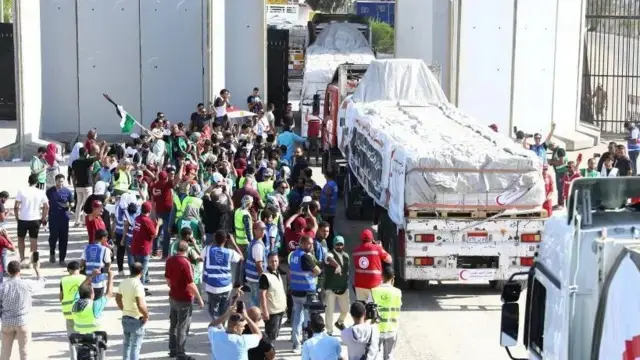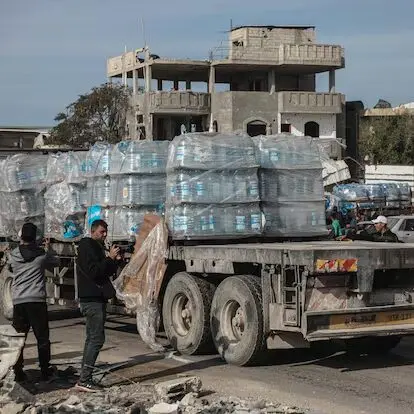7 Critical Truths About Egypt Gaza Humanitarian Airdrops: El-Sisi Defies Blockade with Sky-Borne Aid Amid Genocide Allegations

Egypt Gaza humanitarian airdrops: Egyptian military planes deliver food aid to Gaza amid severe blockade and humanitarian collapse Photo: Perplexity 6/8/2025
August 6, 2025 Hour: 7:47 pm
Egypt Gaza humanitarian airdrops intensify as President El-Sisi orders continuous air deliveries to Gaza, condemning Israel’s blockade and a “war of starvation” in the besieged enclave.
Related: UNRWA Chief Warns of Escalating Famine in Gaza Amid Aid Restrictions
7 Critical Truths About Egypt Gaza Humanitarian Airdrops: El-Sisi Defies Blockade with Sky-Borne Aid Amid Genocide Allegations
On August 7, 2025, Egyptian President Abdel Fattah El-Sisi ordered the continuation of humanitarian airdrops into the Gaza Strip, defying a crippling land blockade and escalating international silence. In a decisive move, 12 Egyptian military transport planes have delivered thousands of tons of food and medical supplies over the past three days to areas of Gaza that are otherwise unreachable by ground. This aerial lifeline comes as the enclave faces what the World Food Programme (WFP) calls a “desperate” crisis, with over 130 people already dead from hunger and malnutrition since October 2023.
The Egypt Gaza humanitarian airdrops are not just aid—they are an act of resistance against a siege that the Egyptian government has labeled a “war of starvation and genocide.”
The decision underscores Cairo’s deepening frustration with the international community’s failure to enforce humanitarian access and its condemnation of Israel’s near-total land blockade, which has been in effect since March 2024. While Israel claims the blockade is aimed at pressuring Hamas to release hostages, the result has been the systematic collapse of Gaza’s food, water, and medical systems.
When diplomacy fails, airdrops become a weapon of moral defiance.
Egypt’s military spokesperson, Gharib Abdel Hafez Gharib, confirmed that the airdrops are a complement to ongoing ground efforts at the Rafah crossing, where Egyptian authorities insist they have kept the border open. However, access remains under Israeli control, and the flow of aid has been severely restricted.

Egypt Gaza Humanitarian Airdrops: A Lifeline in a Landscape of Starvation
The Egypt Gaza humanitarian airdrops are not a new tactic, but their scale and frequency in August 2025 mark a significant escalation. The Egyptian Air Force has used C-130 Hercules and Ilyushin Il-76 aircraft to drop supplies in northern Gaza, where famine conditions are most acute and where over 70% of the population has been displaced.
These airdrops are not precision logistics—they are emergency interventions in a territory where every meal is a miracle.
The supplies include:
- Flour, rice, and canned food,
- Water purification units,
- Medical kits and antibiotics.
The drops target urban ruins, makeshift camps, and hospitals operating without power or clean water. In some cases, families have reported fighting over parachuted food—a tragic sign of how deep the desperation runs.
Despite Israel’s claim that 23,000 tons of aid entered Gaza via land in one week (as reported by DW), humanitarian organizations on the ground say the numbers are grossly inflated and that distribution is chaotic, unsafe, and often looted. The UN and Palestinian Red Crescent have documented hundreds of deaths during aid distribution attempts, including 29 people killed on August 4 while waiting for food.
More trucks do not mean more food reaches the hungry.
External Link: World Food Programme – Gaza Crisis Update
External Link: UN OCHA – Humanitarian Access in Gaza
Geopolitical Context: A Regional Standoff Over Gaza’s Survival
The Egypt Gaza humanitarian airdrops must be understood within a broader regional and global confrontation—one that pits Arab and Global South nations against Western-backed Israeli military actions.
Gaza has become a geopolitical fault line, where humanitarian aid is a proxy for power.
Egypt, a key U.S. ally in the region, is walking a tightrope. On one hand, it maintains security cooperation with Israel. On the other, it faces domestic and regional pressure to act as the primary defender of Palestinian rights. El-Sisi’s decision to escalate airdrops is a calculated political message—to Israel, to the U.S., and to the Arab world.
Cairo is saying: “We will not be complicit in a famine.”
The situation at Rafah remains tense. Egypt insists it has never closed the crossing, but Israel controls the northern side and has repeatedly halted or delayed convoys. Cairo has accused Israel of using the blockade to force a mass displacement of Palestinians into Egyptian territory—a move Egypt has categorically rejected.
Meanwhile, Qatar, Jordan, and the UAE have joined Egypt in aerial aid missions, launching coordinated drops over the past week. France, Germany, and Belgium have also participated, though on a smaller scale.
The world is divided: some are bombing Gaza, others are feeding it.
A Crisis Beyond Numbers: Famine, Death, and Institutional Failure
The humanitarian catastrophe in Gaza is not abstract—it is measured in bodies, not statistics.
- Over 60,000 Palestinians killed since October 7, 2023 (per Gaza Health Ministry).
- 180 people dead from hunger and malnutrition, including 93 children.
- 90% of homes destroyed or damaged.
- 1.9 million displaced.
- Malnutrition among children under five has doubled since March 2025.
This is not collateral damage—it is a man-made famine.
The UN has repeatedly warned that Gaza is on the brink of full-scale famine, yet Israel continues to restrict fuel, water, and electricity. The U.S. Embassy in Tel Aviv and Israeli officials have dismissed the famine claims, with Ambassador Mike Huckabee stating:
“The real story of hunger in Gaza is the hostages held by Hamas.”
When a starving child is blamed for their own hunger, propaganda has won.
Egypt has rejected these claims as morally bankrupt. President El-Sisi stated:
“This is not a war on Hamas. This is a war on the Palestinian people.”
Rafah: The Gateway That Isn’t Open
Despite Egypt’s claims of cooperation, the Rafah crossing remains a bottleneck of suffering.
- Egypt says over 5,000 trucks of aid are ready to enter Gaza.
- Israel allows only a fraction of that number daily.
- Aid that does enter is often looted or destroyed in chaotic distribution scenes.
A border is not open if the people on the other side are starving.
The Palestinian Red Crescent and UNRWA have reported that many aid trucks never reach distribution centers, with armed groups and desperate civilians seizing supplies. This chaos is not accidental—it is the inevitable result of a system designed to fail.
Egypt has called on the UN Security Council to force open humanitarian corridors, but U.S. vetoes have blocked any binding resolution.
Egypt’s Diplomatic Offensive: From Aid to Accusation
El-Sisi has not limited his response to humanitarian action. In recent days, he has launched a diplomatic offensive, accusing Israel of committing genocide and the international community of complicity through inaction.
When silence equals consent, speaking out is revolutionary.
At a recent regional summit, El-Sisi declared:
“The war in Gaza has surpassed all logic. It is a war of hunger, a war of extermination, aimed at liquidating the Palestinian cause.”
He has also criticized Western media narratives, calling them “dishonest” and “biased”, and has urged Arab nations to break their silence.
Egypt’s stance has earned praise across the Global South, but tension with the U.S. is rising. Washington has urged Cairo to moderate its tone, while continuing to supply Israel with billions in military aid.
Conclusion: Airdrops as a Symbol of Defiance
The Egypt Gaza humanitarian airdrops are more than a logistical operation—they are a political statement, a moral stand, and a challenge to the global order.
In a world where power dictates truth, Egypt is using its skies to deliver a different message: Gaza will not be erased.
While airdrops cannot replace a functioning aid system, they are a lifeline for thousands. They also expose the hypocrisy of a world that funds war but starves peace.
As long as the blockade continues, Egypt will keep flying. Not because the drops are perfect—but because doing nothing is the greater crime.
And as the world watches, one truth becomes clearer: the war on Gaza is not just a military campaign—it is a test of humanity itself.
External Link: Al Jazeera – Gaza Famine: The Numbers Behind the Crisis
Author: JMVR
Source: Al Mayadeen

